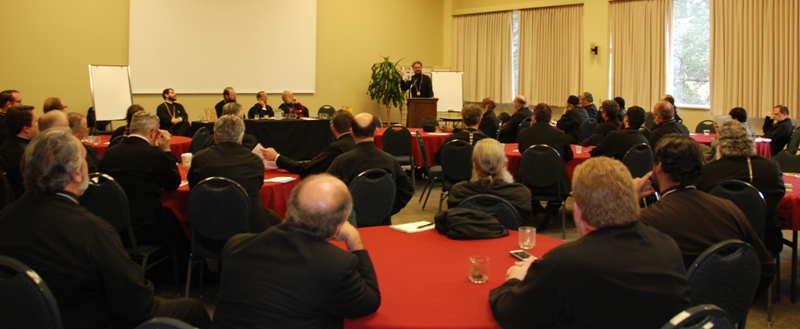2017 Pan-Orthodox Clergy Retreat
The Annual Pan-Orthodox Clergy Retreat was organized this year by the St. Sebatian Orthodox Press, a Ministry of the Serbian Orthodox Diocese of Western America, with the blessings of the Hierarchs of the California Orthodox jurisdictions of California: Metropolitan Gerasimos (Greek), Metropolitan Joseph (Antiochian), Archbishop Kyrill (ROCOR), Bishop Maxim (Serbian), and Archbishop Benjamin (OCA) and was held on November 9 & 10, 2017 at the Mercy Center in Burlingame, California.
We were honored to have His Grace Bishop Irenei, Auxiliary Bishop of the Western American Diocese and Administrator of the Diocese of Great Britain and Ireland and Archimandrite Nathanael Symeonidis, Director of the Office of Inter-Orthodox, Ecumenical and Interfaith Relations presenting on the topic, Humanity and “Itentity”: Discovering the “Self” in a World and in the Church.
The Pan-Orthodox Clergy Retreat is an important gathering which brings the Orthodox clergy on the West Coast together in brotherly love and energizes them in their ministry of service to God and His faithful people entrusted to their pastoral care.
Our presenters took a theological and a very practical approach to the topic and looked at how certain challenges and opportunities in the world often shape our identity.
Discovering the “Self”
What does it mean to “identify” who I am?—and where does this come from? In the Orthodox Tradition, the person is an identity that emerges through relationship (schesis, in the terminology of the Greek Fathers). The human being is constituted by a call from God, and its identity is constantly formed through the response to this call. Life in Christ means placing all our relations, in and through which we obtain our personal identity, in the person of Christ. The “new birth,” which is the essence of Baptism, is the acquisition of an identity not dependent on the qualities of nature but freely raising nature to a personal existence which emerges from the Father-Son relationship.
Now, questions of “identity” plague our society, including that of cultural, sexual, religious identity, etc. Worldly notions of “identity politics” often conflict and present challenges for the Church. These “contextual” questions of identity must be seen as part of a larger vision of identity itself.
What do we as pastors do when confronted by people who have different identities than that molded by the Church or try to change their identity or who don’t realize their identity has been changed?






